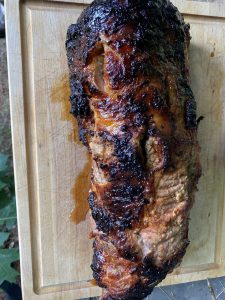I realize that I’ve picked up a lot of new traffic to the blog over the last few months, so today’s post perhaps needs some introduction. Over the years here I’ve often posted recipes during breaks and holidays – the old saying is that you should never trust an organic chemist who can’t cook, and there’s something to it. I’ll be adding a “Recipes” category to the list in the sidebar, something I keep meaning to do, and collecting all the ones I’ve posted there, so if that sort of thing appeals to you they’ll all be in one place. If it doesn’t, you at least know that it’s not a cooking site and that the next post will be on something like T cells, C-H activation reactions, photoaffinity labeling or liver enzymes.
I made this yesterday for the Fourth of July – not exactly traditional for this region of the country, but old-fashioned Independence Day food here would be salmon and peas, and I’m not enough of a New Englander for that. What follows is an adaptation of a recipe from Steve Raichlen’s “Barbecue Bible” book for Cuban roast pig. Raichlen’s recipe is scaled for a whole fresh ham. I used a good-sized pork loin for this (which I think needs aggressive seasoning anyway), but you could also use a pork shoulder cut, in which case you’ll probably want to cook that longer and slower or it’ll be tough, which would be a shame.
- 1 6-pound (2.7 kg) pork loin
- 1 entire head of garlic (peeled cloves)
- 1 tablespoon coarse salt, such as Morton’s Kosher, which would be about 15g. Others will vary, with Diamond Crystal being the lightest and fluffiest by volume.
- 1/2 tablespoon dried oregano (1.5g)
- 1/2 tablespoon ground cumin (3g). Freshly ground is definitely better if you can manage it
- 1/2 tablespoon ground black pepper (3.5g) Likewise, freshly ground is the way to go if you can.
- 1 cup (250 mL) freshly squeezed lime juice
- 1 teaspoon sugar (4g)
- 3 tablespoons olive oil (45 mL)
- 2 bay leaves, broken up
- 1 large onion, thinly sliced
 Cut several short lengthwise slits into the port loin, around all sides. Crush up the garlic cloves in a mortar and pestle or run them through a garlic press, and blend with the salt, oregano, cumin, and pepper to make a thick (and extremely aromatic!) paste. Work this paste into the slits in the meat and then around all the surface. Dissolve the sugar in the lime juice. Place the meat into a sturdy plastic bag – I double-bagged, personally – and pour in the lime juice and olive oil adding the bay leaves and the sliced onion. Sluice this around to distribute everything and let in marinate in a refrigerator overnight (I did about 16 hours), flipping the bag around once in a while so that everything gets soaked evenly.
Cut several short lengthwise slits into the port loin, around all sides. Crush up the garlic cloves in a mortar and pestle or run them through a garlic press, and blend with the salt, oregano, cumin, and pepper to make a thick (and extremely aromatic!) paste. Work this paste into the slits in the meat and then around all the surface. Dissolve the sugar in the lime juice. Place the meat into a sturdy plastic bag – I double-bagged, personally – and pour in the lime juice and olive oil adding the bay leaves and the sliced onion. Sluice this around to distribute everything and let in marinate in a refrigerator overnight (I did about 16 hours), flipping the bag around once in a while so that everything gets soaked evenly.
I cooked this on a rotisserie on a gas grill, at about 400F (200C) for two hours (no direct heat under the meat), looking for an internal temperature of about 160F (70C). You could grill it over indirect heat, turning it often, or roast it in an oven as well. I tend to like pork fairly well-done, so adjust for your tastes and tolerances. I did need to cover the fat side of the meat with a wrap of aluminum foil for the last 30 minutes to keep it from getting too dark.
The finished product is shown. I let it rest for a few minutes after taking it off the heat (standard recommendation for roasted meats. It comes out pretty tender – not surprisingly, after being soaked in lime juice and onions for that length of time.
